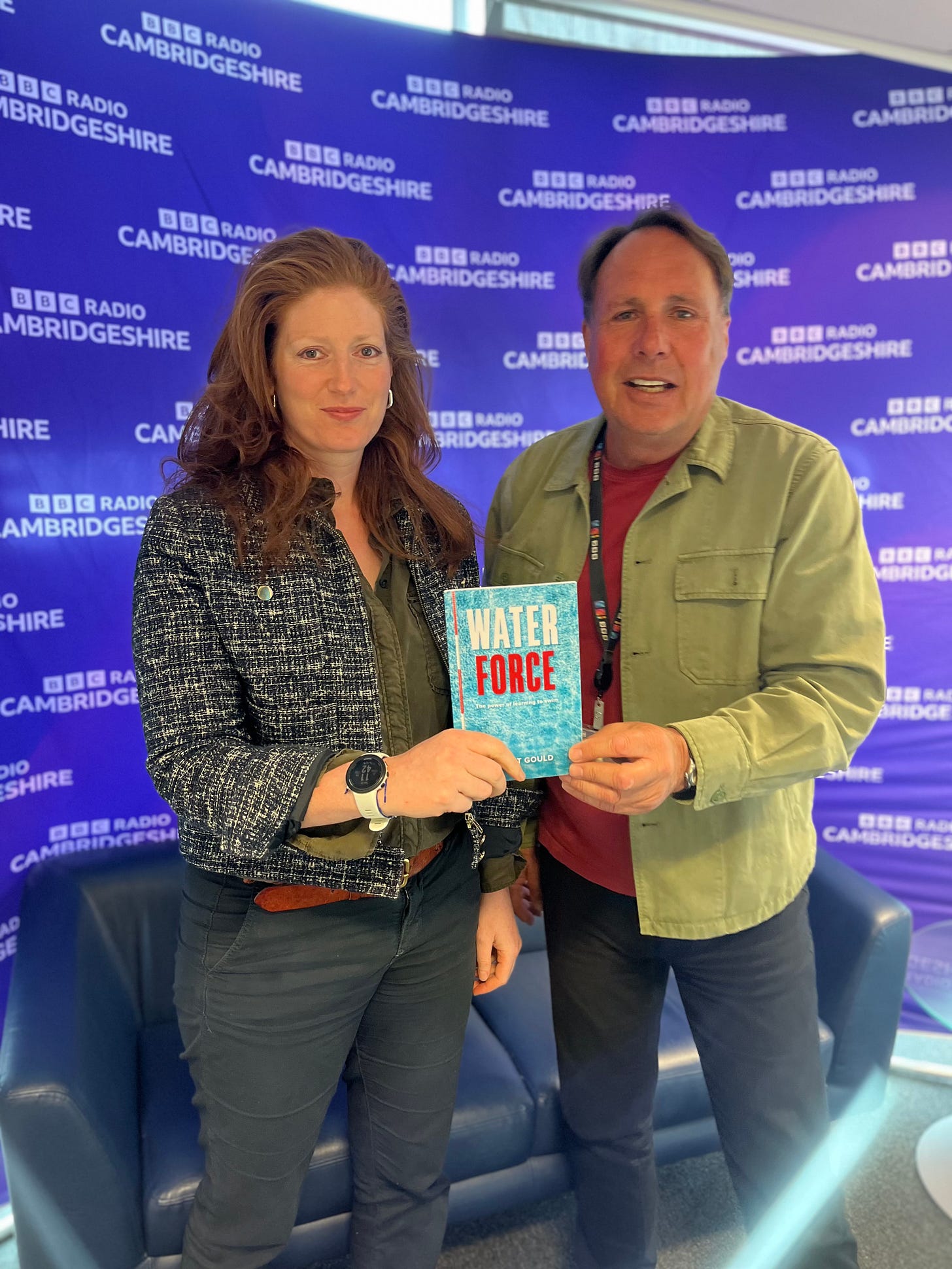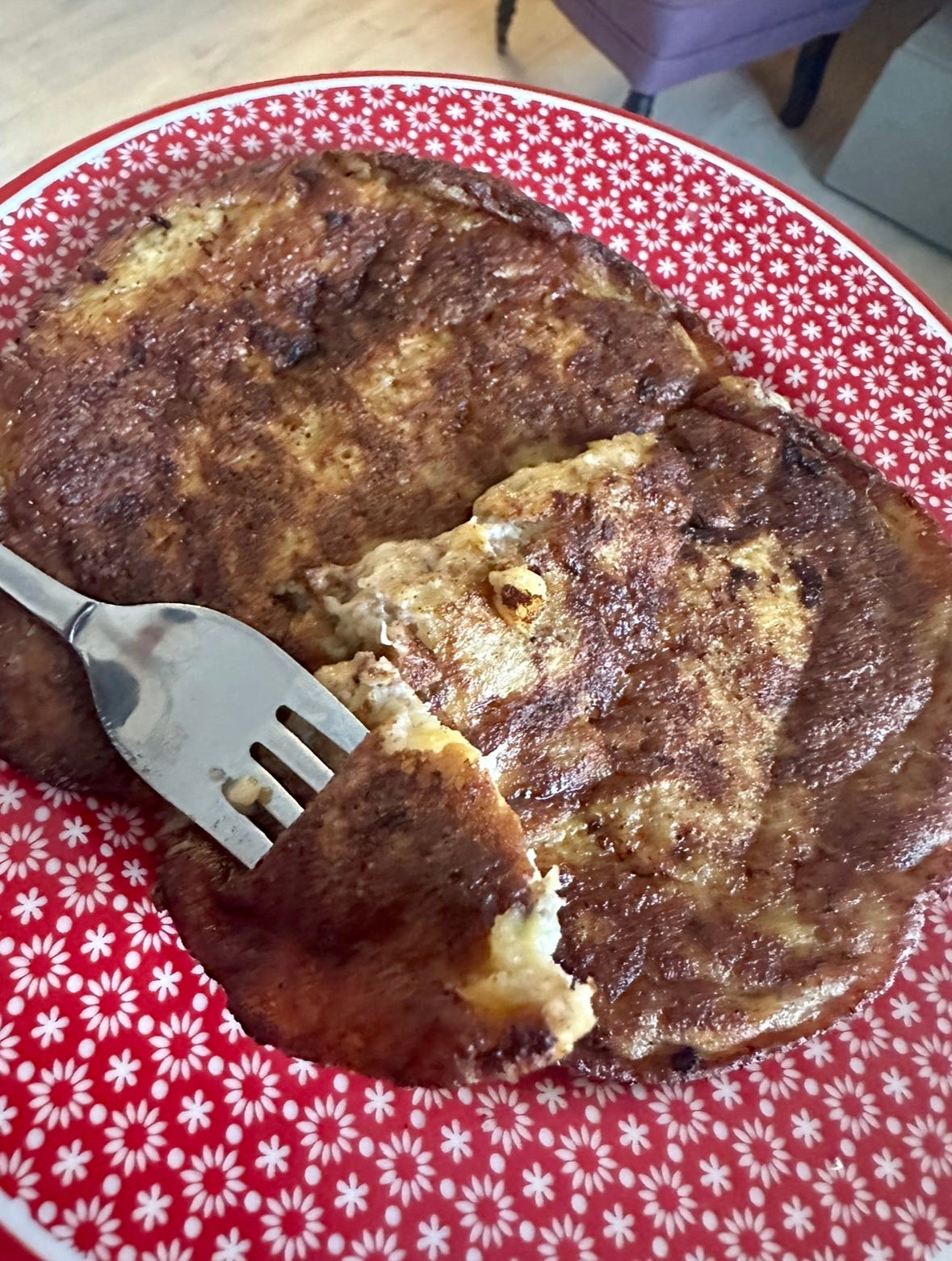Crossing the Pond For This Week's Newsletter!
Introducing British author Harriet Gould - you're going to love her story! Be sure to read to the end for her unique weekly routine & dining idea.

Welcome to another issue of Who I’d Rather Be Talking About, where I interview cool and interesting people from all over the world. Today I’d rather be talking about Harriet Gould, an author, advertising professional, podcast host, and overall interesting gal.
I’ve never actually met Harriet IRL, but I met Harriet’s mom, Jane, this past September at the Solheim Cup in Spain. Jane and I had a delightful conversation and have continued to message back and forth since last year. In one of our chats, Jane told me about her daughter Harriet, and I immediately knew I wanted to find out more about her life and career.
I’m happy to introduce you all to Harriet Gould.
Abbey: Can you tell us where you grew up, went to school, and where you’re living now?
Harriet: I was born in London (Queen Charlotte’s, Hammersmith) and have lived in a few places and am in Cambridgeshire as we speak! I grew up all over the place and changed schools a few times as a result, eventually leaving school early (just before I turned 15) to leave home and work at a showjumping yard in Buckinghamshire.
A: You represented Great Britain on the Junior Showjumping Squad - please tell me about this… it sounds so interesting!
H: I was competing at a high standard- the highest standard - at the time so had assumed making the squad was an inevitability. Looking back I realize it was against the odds. My contemporaries all had a string of international horses for a start. I had one horse, Rocky. I think our highest national ranking was #56. I loved the team spirit on the squad. We all adored each other and our respective horses as though we were of the same cloth.
A: Do you still jump?
H: Under exceptional circumstances, I may be persuaded! It’d be fun to do it as a reality TV show or something… to see if I could get back to my “former glory” having been out of it for 20 years!
A: Can you share a bit about your career and how it has evolved over the years? What are you currently doing?
H: I transferred from the horse world into the corporate one via advertising sales. I was very used to selling horses (and other animals that reproduced at will). I thought, “How hard can it be to sell in an advertising context?” Luckily for me I took to it straight away so tried a few different thing in that remit; big brand events like Royal Ascot, Crufts and National Boat Shows. Then I tried the financial services exhibition scene before trying radio airtime. Eventually I settled in the science sector (via the legal sector) and currently work at the Royal Society of Chemistry and host the science-themed podcast Lab Matters. In addition, I do selected sales and marketing consultancy work.
A: Let’s talk about your book, Water Force. Can you tell us a bit about it, and what inspired you to write it? Was it a personal story?
H: I’d heard of this thing called the London Classics. It’s a three part challenge comprising the London Marathon, Ride London (100 miles bike ride) and Swim Serpentine (2 miles swim). I couldn’t swim at the time but desperately wanted the medal that was awarded to those who completed the challenge so I entered… and that sort of forced me to learn to swim. That’s right, I COULDN’T SWIM when I entered the event! It felt so momentous afterwards that I thought writing a book about it would help me to process the enormity of what I’d achieved. So yes, very much a personal story.
A: How did you get the idea for the title, Water Force?
H: I’d had some working titles along the way and they all failed my stringent branding standards so I approached it as I would for any branding or marketing conundrum. I wanted a familiar sounding name that was easy to say and looked balanced when written down, as well as being related to the book and personally relevant.
A: Have you always been a writer?
H: In short, NO! Quite the opposite. I couldn’t even read until I was ten (when the teacher finally read the class something funny and interesting). I am dyslexic and always struggled to maintain a train of thought for long enough to translate it to paper (screen) and I never really thought I would have much to say. Then a few years ago I became friends with a few people who happened to be writers (journalists and authors).
They all - independently - told me to keep a diary, so, at the start of the following year I did as they said. It was burdensome initially but I stuck with it. After a few months I noticed I was finding it easier to translate my thoughts from mind to paper.
Now, it feels fluid, as though the thoughts and the writing happen in unison. I feel myself editing as I go, in that microsecond between the thought and the typing. I think it was some of the best advice anyone ever gave me.
A: What was the writing process like - how long did it take you to complete Water Force? How did you go about getting it published?
H: Because it’s such a personal book I opted to self-publish to avoid the process of justifying it to a publisher or agent. I committed to a deadline and worked backwards to know how many words I’d need to write each day to keep to that deadline… and I stuck to it. It’s much easier to edit than to write on a blank page so I’d write to the best of my ability every day and the start of every session was reading the last section and rewriting that! I don’t know if that’s advisable… it’s just how things worked out for me.
A: Do you have plans for a second book?
H: I’d love to write another book! A work of fiction this time. I don’t know how long it will take and I’ll need an agent… watch this space.
A: Now let’s talk about your podcast, Lab Matters. What was the inspiration behind it?
H: Lab Matters is part of the Lab Innovations trade exhibition and conference for which I Chair the Advisory Board. The orgainsers decided to launch a podcast to add value to the community and they asked me to host it. I jumped at it because over the years I’ve met a huge number of talented and intriguing people and had always had this vision of introducing as many of them as possible to as many people as possible so the two elements were perfectly matched. We finished season one in May and season two will launch at the start of July.
A: Where can people listen to Lab Matters?
H: Spotify, Apple podcasts, Amazon, YouTube etc.
A: Any advice for people wanting to write a book or start a podcast? (Or both!)
H: In both cases: think of the people who are listening/reading and write for them. They’re the only ones who matter. (I was given that advice)
FUN ROUND:
Give us a peek into your daily routine. What's a typical day like for you?
I walk every day and eat the same thing for breakfast every day; boiled egg and smoked salmon trimmings OR banana and cinnamon pancake. Boiled egg is the default and pancake is if I am cold or tired.
Monday mornings - checking what’s on for the week and what I need to have done by the end of the week and what I need to do to get those things done. Keep Monday evenings free as much as possible to recover from the effort of the first day of the week.
Other evenings are good for networking events, recording, reading etc.
Tuesday - I’ve usually run out of food by now - I’m terrible at planning food - so I stock up from one of the many local farm shops. Sounds expensive, but it is not. Plus everything is so fresh you eat it all before it goes bad.
Wednesday lunchtimes - exercise session (followed by cold shower).
Thursday - early morning day for swimming in the lake up the road. I prefer swimming pools these days but it’s convenient. Soon I’ll be running there every other week to start to get in condition for the Paris marathon.
Friday is for prospecting so I have things to follow up over the weekend and the following week.
Top tip! I have different plates and cups for the weekend. It is a symbolic ritual to use the weekend cups and plates only at the weekend. It’s a simple way to define time.
A: When you're not busy working, writing, or podcasting, what's your go-to for unwinding and having fun?
H: I never really feel so “wound” that I need to unwind! When I’m tired I have a break or a holiday. I also have four types of massage on a two month rotation (i.e. a massage every two months) which seems to keep me fresh. Luckily for me my friends are integral in much of what I do so it’s seamless.
A: Can you share some hot spots or must-see spots in London? Favorite restaurants, pubs, etc.?
H: I’m terrible at this. I love wherever I am as long as I’m with good people! I’m reading about Hogarth at the moment so anywhere along the Thames where I can convince myself I’m in 18th century London.
Do you have any podcast, streaming, or book recs to share with readers?
I’m listening to a lot of finance content at the moment. ISAs, investing etc.
Lastly, do you have a mantra or quote that you live by?
I have two - both come from my first boss back when I was showjumping:
1. “Use your brain to save your legs.”
(She didn’t like people wandering around aimlessly.)
2. “Why put off ‘till tomorrow what can be done today?”
This was terrible in bad weather; it’d be blowing a gale or pouring with rain and I’d say, “Why don’t we just put them on the (horse) walker today?”
And she’d say “Nah, ride them… it might be worse tomorrow…”
Thank you for the great advice and for sharing a bit about your life, Harriet!
Purchase Harriet’s book, Water Force.
Listen to Harriet’s podcast, Lab Matters.







Ok - I’m somewhat biased - but what an energising interview!